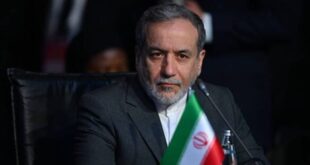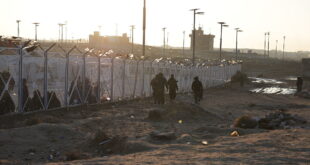3 killed as bombs strike commuter buses on eve of Lebanon rally for slain PM
Bomb blasts killed three people on commuter buses Tuesday and lawmakers blamed Syria, stirring fears of clashes between Hezbollah and government supporters at a massive rally planned to mark the assassination of Lebanon’s former prime minister.
The explosions stoked fears of more turmoil as an already tense Lebanese capital braced for Wednesday’s commemoration for Rafik Hariri. A huge rally was planned at his grave _ just feet from ongoing opposition protests seeking to topple the government.
Lebanon has been hit by a string of bombings the past two years that many government supporters blame on Syria. Syria has denied any role in the attacks, including the suicide truck bombing that killed Hariri and 22 others on Feb. 14, 2005.
After Tuesday’s blasts, the pro-government majority coalition in parliament said in a statement that it holds “the Syrian regime fully responsible for this despicable crime.” It accused Syria of trying to “make Lebanon another Iraq by destroying its security and stability.”
The coalition also pointed a finger at Syrian-backed Hezbollah and called for beefing up security on the border with Syria “to halt the flow of arms to subversive groups directly linked to (Syria’s) regime.”
The bombs Tuesday ripped through two commuter buses traveling on a busy mountain highway northeast of Beirut, killing three and wounding 20, police said.
Witnesses at Ein Alaq, a village in pine-wooded mountains a 30-minute drive northeast of Beirut, said the first bomb exploded in a bus around 9 a.m. As people rushed to the scene, a second explosion, about 10 minutes later, tore through a second bus that had driven up.
The buses were carrying people to work, and witnesses said they pass at 10-minute intervals, ferrying people from Christian mountain villages to the coast and Beirut while stopping along the way for whoever hails them or wants to get off.
Pro-government groups said the attacks were intended to scare people away from Wednesday’s rally for Hariri, who was an opponents of neighboring Syria’s interference in Lebanese affairs. They were adamant the gathering would not be canceled.
“We will hunt down the criminals and confront them,” the U.S.-backed prime minister, Fuad Saniora, vowed in a televised speech Tuesday evening. “We will not back down in our search for truth. We will remain intent on preserving national unity.”
None of the perpetrators have been caught in the string of bombings the past two years, which killed and maimed a number of anti-Syrian figures and have occasionally struck public areas.
The blasts have fueled tensions amid Lebanon’s escalating political power struggle, in which the opposition, led by the Syrian- and Iranian-backed Hezbollah, has vowed to bring down Saniora’s government.
President Emile Lahoud, a staunch pro-Syrian who has sided with the opposition, said the bombings sought to undermine efforts to reach compromise between bitterly split Lebanese factions.
“Every time the Lebanese seem close to an agreement, enemies of Lebanon commit another crime,” Lahoud said in a statement.
The potential for violence was high even before the latest bombings.
The army has installed a razor-wire barrier to separate the opposition’s protest encampment on the main downtown Martyrs’ Square from the rally next to Hariri’s grave. Troops have deployed on highways to prevent friction between supporters of the two sides en route.
Last month, disturbances killed eight people and wounded dozens. A Jan. 23 strike turned into clashes with guns, clubs and stones, while an argument among students on a university campus two days later led to rioting.
At the site of Tuesday’s bombings, the two buses lay about 30 yards apart, the first with its roof twisted and its back shattered. The roof of the second bus was blown off, with seats thrown on the road and pools of blood around the wreckage.
Police with sniffer dogs and soldiers sifted through the debris. The area was sealed off and the highway, a usually busy road linking Christian towns in the mountains with the capital, was blocked.
Security officials estimated the size of the “banana-shaped” bombs at four to seven pounds each and said the explosives were packed with metal pellets and put under seats in the buses.
“May God’s wrath fall on all of them who did this,” said Genevieve Hayek, in her 70s, the owner of a roadside snack bar 15 yards from the bombing scene. She had rushed along with motorists to help the victims. “What is the fault of the people just going to work?”
Katina Shibli was driving on the road ahead of the first bus when she heard the first blast. “We stopped immediately, I rushed to help,” she said. “The traffic backed up quickly, when within 10 minutes, the other explosion happened.”
A security official said the casualty figure could have been much higher if most passengers from the second bus had not rushed out to help those in the first.
The blasts occurred in the same Christian heartland as most of the previous explosions that have rocked Lebanon since Hariri’s assassination, targeting anti-Syrian politicians, journalists and commercial and industrial centers. A U.N. investigation into Hariri’s murder also is looking into the other attacks.
“I believe that those who kill in Lebanon are known,” Edy Abilamaa, a leading member of the Christian Lebanese Forces pro-government faction, said in a veiled allusion to Syria.
The latest violence came amid reports that Arab League chief Amr Moussa put off plans to mediate between Hezbollah and pro-government forces. League officials said Tuesday that Moussa canceled a trip to Beirut after a message from leaders of Hezbollah and Amal, the two main Shiite Muslim groups, who allegedly prefer another mediation channel.
 Eurasia Press & News
Eurasia Press & News


